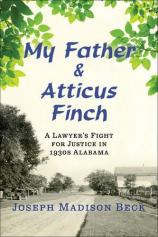My Father and Atticus Finch: A Lawyer's Fight for Justice in 1930s Alabama
Review
My Father and Atticus Finch: A Lawyer's Fight for Justice in 1930s Alabama
TO KILL A MOCKINGBIRD has been and remains one of the most revered novels of the 20th century. 2015 saw the release of a new Harper Lee book, GO SET A WATCHMAN, that was published to much hype, anticipation, disappointment and debate. It also marked the passing of the legendary author, whose life after the publication of MOCKINGBIRD was unique in many aspects. Avoiding the public literary limelight, she spent the majority of her life in her hometown of Monroeville, Alabama, with her sister, Alice. In recent years, several unauthorized biographies of her life were released, and a semi-authorized one, THE MOCKINGBIRD NEXT DOOR by Marja Mills, was published to some controversy when Lee disavowed it.
"Atticus Finch lives in the minds of many as an inspiration. Foster Beck reminds us that the inspiration comes not from one fictional man, but from courageous men fighting for justice across our nation."
MOCKINGBIRD, in part, centered on the trial of Tom Robinson, a black man charged with rape. Atticus Finch, the attorney father portrayed in the book, is called upon to represent Robinson. Despite clear evidence of his innocence, Robinson is convicted and shortly thereafter dies while attempting to escape from authorities. Attorney Joseph Madison Beck’s MY FATHER AND ATTICUS FINCH is a memoir about his own father, Foster Campbell Beck, who in the 1930s defended a black man accused of rape in a small Alabama community. Beck went so far as to write Lee because his research found a number of similarities between the case tried by his father and the fictional case presented in the pages of MOCKINGBIRD. Lee wrote Beck and acknowledged the “obvious parallels,” but told him she could not recall her father’s case and that her book was “fiction.”
The history of the South in 1930s Alabama clearly tells us that there were few, if any, African-American attorneys practicing law. That same history tells us that many African-Americans charged with the rape of white women were defendants in criminal cases across the state. Therefore, it would not be difficult to find instances where white attorneys were called upon to represent black defendants in court. Rape was a crime punishable by death, and since the trial of the Scottsboro Boys in an Alabama courtroom in the 1920s, the appointment of counsel to those charged with capital crimes was required by the U.S. Constitution. Those numbers make it clear that there were countless white Alabama attorneys who served as court-appointed counsel in rape cases. Many of their descendants would welcome the opportunity to claim to be the model for Atticus Finch, one of America’s most revered fictional characters.
It makes little difference whether or not there is a connection between Foster Beck and Atticus Finch. MY FATHER AND ATTICUS FINCH can stand on its own as an important reminder of just how far America’s legal system has progressed in the last 75 years. Joseph Beck has combined his family’s handwritten history, interviews, newspaper articles and trial transcripts to paint a vivid portrait of his father’s role in representing Charles White. While Finch’s representation of Robinson lacked sufficient details of an actual criminal case, Beck provides a lot of those specifics in his book. The prison visits, appellate briefs, community backlash and immense personal toll that comes from death penalty litigation are all part of this memoir.
Atticus Finch lives in the minds of many as an inspiration. Foster Beck reminds us that the inspiration comes not from one fictional man, but from courageous men fighting for justice across our nation.
Reviewed by Stuart Shiffman on June 30, 2016
My Father and Atticus Finch: A Lawyer's Fight for Justice in 1930s Alabama
- Publication Date: June 21, 2016
- Genres: Memoir, Nonfiction
- Hardcover: 240 pages
- Publisher: W. W. Norton & Company
- ISBN-10: 0393285820
- ISBN-13: 9780393285826





